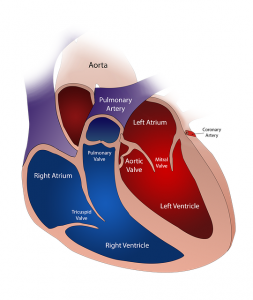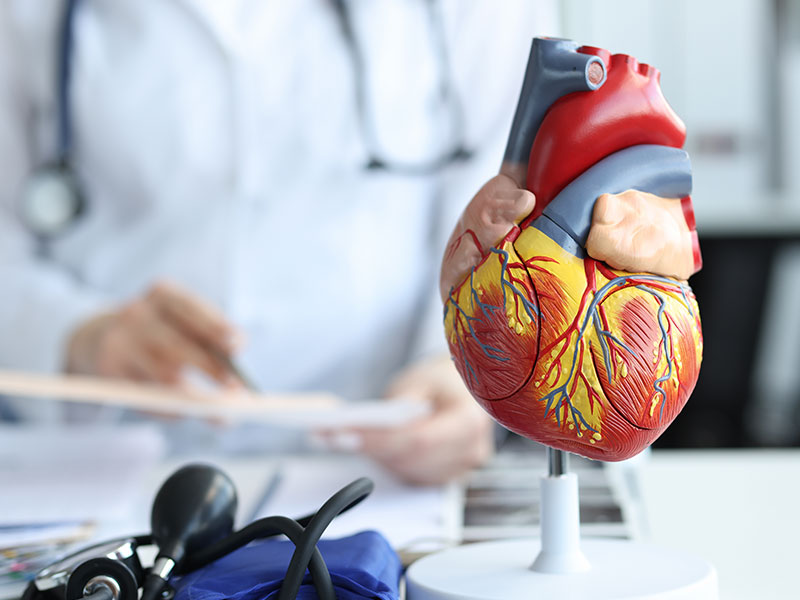
Coenzyme Q10 supplementation is associated with improved left ventricular ejection fraction in more than a dozen randomized controlled studies.
What does Coenzyme Q10 do for the heart muscle? Quite a lot, it turns out.
Coenzyme Q10 supplementation has been shown in clinical trials to have the following effects with benefit for the heart:
- improves left ventricular ejection fraction
- improves endothelial function
- improves NYHA class
- improves contractility
- inhibits platelet aggregation
- compensates for statin medication
Let’s look more closely at these effects of CoQ10 supplementation.
CoQ10 Supplementation Improves Left Ventricular Ejection Fraction
Ejection fraction is the percentage of the blood that the heart muscle is able to pump out with each heart beat [Cleveland Clinic].
- In the healthy heart, the ejection fraction should be in the range from 55% to 70%.
- An ejection fraction of 35% to 40% is indicative of mild heart failure.
- An ejection fraction below 35% indicates moderate to severe heart failure.
A 2013 meta-analysis of 11 heart failure clinical trials showed that CoQ10 supplementation resulted in a pooled mean net increase in the patients’ ejection fraction [Fotino].
To these studies, we can add the 2019 sub-group analysis of the European participants in the Q-Symbio Study. The Q-Symbio Study investigated the effect of Coenzyme Q10 on morbidity and mortality in chronic heart failure. That analysis also showed a significant effect of CoQ10 supplementation on the patients’ ejection fraction [Mortensen 2019].
CoQ10 Supplementation Improves Endothelial Function
The endothelium is the thin lining of cells on the inside of blood vessels. The healthy endothelium regulates the dilation and constriction of blood vessels and limits the risk of thrombosis and inflammation in the blood vessels.
Researchers in a 2006 study found that CoQ10 supplementation – 3 times 100 milligrams per day – was effective in ameliorating endothelial dysfunction and functional impairment in patients with stable moderate chronic heart failure. Endothelium-dependent relaxation of the brachial artery improved significantly in the CoQ10-treated patients; the improvement in the endothelium-dependent relaxation after CoQ10 supplementation was positively correlated with increase in plasma CoQ10 levels [Belardinelli].
CoQ10 Supplementation Improves NYHA Class
The New York Heart Association functional classification is used to assign a category to heart failure patients according to how much the heart failure limits their physical activity, with category I for no limitation, category II for mild limitation, category III for moderate limitation, and category IV for severe limitation.
An early study study showed that heart muscle tissue levels of Coenzyme Q10 were significantly lower in patients in NYHA categories III and IV than in patients in categories I and II [Mortensen 1993].
Three clinical trials of CoQ10 supplementation for heart failure patients have shown slight but not statistically significant improvement in the patients’ NYHA category [Fotino]. But the improvement could be clinically relevant.
CoQ10 Supplementation Improves Contractility of Heart Muscle Tissue
Researchers gave cardiac surgery patients 300 milligrams of Coenzyme Q10 daily or matching placebos for two weeks prior to the surgery. As part of the study, they excised small samples of heart muscle tissue from the right atrium of the patients’ hearts and subjected the tissue to hypoxia (a reduced oxygen environment) for 30 minutes. The purpose of the imposed hypoxia was to simulate the condition of a heart attack. Then the researchers re-oxygenated the tissue and measured the contractile recovery of the tissue [Rosenfeldt].
The heart muscle tissue of the surgery patients who had received the CoQ10 supplements for two weeks and who had higher serum CoQ10 levels showed significantly greater contractile strength than did the heart muscle tissue from the patients who had received the placebo treatment [Rosenfeldt].
CoQ10 Supplementation Inhibits Platelet Aggregation
Researchers enrolled healthy volunteers, non-smokers with no history of bleeding disorders or recent drug administration, in a study in which the volunteers took 2 times 100 milligrams of Coenzyme Q10 daily for 20 days. Blood analysis showed that the CoQ10 supplementation – which raised plasma CoQ10 levels threefold – is associated with the inhibition of platelet activity in terms of cell-size distribution and in terms of the surface expression of vitronectin receptors [Serebruany].
Platelets, also called thrombocytes, are the component in the blood that reacts to bleeding. Platelets clump together to form blood clots to stop bleeding.
The effect of CoQ10 supplementation in reducing the size of blood platelets – smaller platelets are less active than larger platelets – and in decreasing the extent of platelet aggregation may play a role in reducing the risk of coronary artery disease and stroke.
CoQ10 Supplementation Compensates for the Statin Medication
The use of statin medications to reduce the bio-synthesis of cholesterol simultaneously inhibits the bio-synthesis of Coenzyme Q10. It is practically impossible to make up for the loss of endogenous Coenzyme Q10 by eating more food. Consequently, CoQ10 supplementation is needed to compensate for the loss of CoQ10 produced internally.
Without CoQ10 supplementation, there is a risk of reduced ATP energy production (and reduced energy for the muscles including the heart muscle) as well as a risk of reduced antioxidant protection of mitochondrial DNA against damage by harmful free radicals [Okuyama].

Dr. William V. Judy, founder and president of SIBR Research Institute, has described the Q-Symbio heart failure study as the best Coenzyme Q10 clinical research study we have. Dr. Judy is also much impressed by the KiSel-10 senior citizens study.
Conclusion: Coenzyme Q10 and Heart Diseases
The prevention and treatment of cardiovascular disease is the primary focus of Coenzyme Q10 clinical research. Coenzyme Q10 has been found to be an independent predictor of mortality in heart disease patients. The beneficial effects of CoQ10 supplementation for heart patients are associated with Coenzyme Q10’s bio-energetics function, antioxidant role, anti-inflammatory role, and role in maintaining endothelial function [Littarru].
The Q-Symbio Study has shown that daily supplementation with 3 x 100 milligrams of Coenzyme Q10 for two years significantly improves the symptoms and survival of chronic heart failure patients [Mortensen 2014].
The KiSel-10 Study has shown daily supplementation with a combination of 2 x 100 milligrams of Coenzyme Q10 and 200 micrograms of an organic high-selenium yeast for four years significantly reduces cardiovascular mortality, improves heart function, and improves health-related quality of life [Alehagen].
Read our key article about CoQ10 and cardiovascular health in elderly people
Read our key article on CoQ10 as adjuvant therapy for heart failure
Sources
Alehagen, U., Johansson, P., Björnstedt, M., Rosén, A., & Dahlström, U. (2013). Cardiovascular mortality and N-terminal-proBNP reduced after combined selenium and coenzyme Q10 supplementation: a 5-year prospective randomized double-blind placebo-controlled trial among elderly Swedish citizens. International Journal of Cardiology, 167(5), 1860-1866.
Belardinelli, R., Mucaj, A., Lacalaprice, F., Solenghi, M., Tiano, L. & Littarru, G-P. (2006). Coenzyme Q10 and exercise training in chronic heart failure. Eur Heart J, 27(22): 2675-81.
Cleveland Clinic. (2019). Heart Failure: Understanding Heart Failure. Retrieved from https://my.clevelandclinic.org/health/diseases/17069-heart-failure-understanding-heart-failure
Fotino, A.D., Thompson-Paul, A.M. & Bazzano, L.A. (2013). Effect of coenzyme Q10 supplementation on heart failure: a meta-analysis. Am J Clin Nutr, 97(2): 268-75.
Littarru, G-P & Tiano, L. (2010). Clinical aspects of coenzyme Q10: an update. Nutrition, 26(3):250-4.
Mortensen, S. A., Rosenfeldt, F., Kumar, A., Dolliner, P., Filipiak, K. J., Pella, D., & Littarru, G. P. (2014). The effect of coenzyme Q10 on morbidity and mortality in chronic heart failure: results from Q-SYMBIO: a randomized double-blind trial. JACC. Heart Failure, 2(6), 641-649.
Mortensen, A. L., Rosenfeldt, F., & Filipiak, K. J. (2019). Effect of Coenzyme Q10 in Europeans with chronic heart failure: A sub-group analysis of the Q-Symbio randomized double-blind study. Cardiology Journal, 26(2): 147-156.
Mortensen, S. A. (1993). Perspectives on Therapy of Cardiovascular Diseases with CoQ10. Clinical Investigator, 71: S116-23.
Okuyama, H., Langsjoen, P. H., Hamazaki, T., Ogushi, Y., Hama, R., Kobayashi, T., & Uchino, H. (2015). Statins stimulate atherosclerosis and heart failure: pharmacological mechanisms. Expert Review of Clinical Pharmacology, 8(2), 189-199.
Rosenfeldt, F., Marasco, S., Lyon, W., Wowk, M., Sheeran, F., Bailey, M. & Pepe, S. (2005). Coenzyme Q10 therapy before cardiac surgery improves mitochondrial function and in vitro contractility of myocardial tissue. The Journal Of Thoracic And Cardiovascular Surgery, 129(1), 25–32.
Serebruany, V. L., Ordonez, J. V., Herzog, W. R., Rohde, M., Mortensen, S. A., Folkers, K., & Gurbel, P. A. (1997). Dietary coenzyme Q10 supplementation alters platelet size and inhibits human vitronectin (CD51/CD61) receptor expression. Journal Of Cardiovascular Pharmacology, 29(1), 16–22.
The information contained in this review article is not intended as medical advice and should not be construed as such.








Leave A Comment